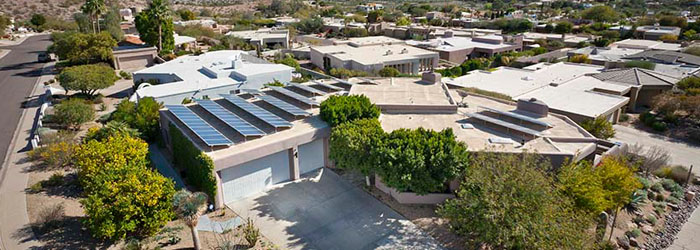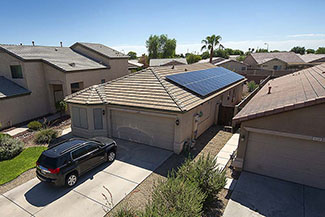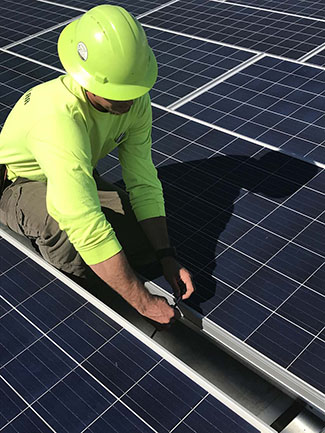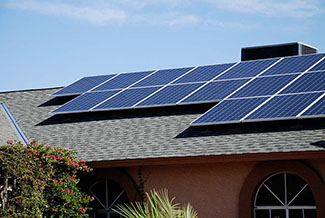Urgent Update on Solar
 29 March 2017
29 March 2017 

Deadlines. Details. Decisions.
You may wonder if solar electric power is still a good buy for homeowners. That's because power companies have been changing how they reimburse homeowners for electric power produced in panels on roofs. More changes may come soon.

So if you're interested in having solar electric power at your home, will it still give you a return on your investment due to all these changes?
As you may know, the debate about solar often focuses on net metering, a practice that helps make solar panels more affordable for homeowners. Under net metering, if the energy produced by solar panels is greater than the power your home uses in a month, your account gets a credit.
For years, utilities have been awarding credits per kilowatt hour based on how much solar energy is exported to the utility grid. Generally, solar homeowners in Arizona use the credits built up in winter to help pay for heavier use of utility power during summer.
Net metering continues, but there are lots of new challenges for most utility customers in the state, whether they install solar or not. That's due to a trend at the largest utilities toward having more demand-based pricing systems for energy.
Salt River Project (SRP) has already adopted a plan like this. Under demand pricing, customers continue to pay for total electricity use, but they are also assessed demand fees based on their highest single hour of energy consumption during hours of peak energy use.
What's Next for Arizona Public Service (APS)?

State regulators -- the Arizona Corporation Commission – have also approved some changes utilities have been asking for. So, if you are an APS customer and want to go solar, here's what you should know:
If you sign up before July 1, 2017, to install solar electric power panels, you can enjoy the present more beneficial solar rate plan for 20 years. Not only will you get today's rates for net metering for 20 years, those rates pass on to whoever buys your home during that time.
"If you buy right now, you can lock into rates that are available today," says Kyle Ritland of Sun Valley Solar Solutions. "You'll be grandfathered in for 20 years." Changes are still occurring, however. In fact, the Corporation Commission is expected to decide soon on other APS issues.
If you sign up after July 1, you will be grandfathered in for 10 years to the net metering rate in place when you join the system. After that, the export rate paid to homeowners could decline up to 10 percent annually. So, benefits to installing solar can gradually change.
If you're thinking of upgrading the existing solar system on your roof, you want to do it now. That's because adding new panels or an inverter after July 1 can void the terms of the grandfathering clause system. It's as if your system becomes a new one. You will have to move to one of the new plans available after the rate case has taken effect.
What's Next for Salt River Project (SRP) and Tucson Electric Power (TEP)?
SRP, not regulated by the Corporation Commission, had expected that the average solar customer would end up paying $50 more per month than before the utility's change to a demand system. But instead the average solar customer paid $29 more. Solar homeowners apparently softened the impact of the change by changing their use of SRP power to less costly times of day. SRP managers had originally theorized that customers would probably do that.
TEP says it wants "to revise rates and rules for new users of solar power systems to increase recovery of the costs incurred to serve them and reduce cost burdens for other customers." Basically, the utility is trying to revise its system for compensating solar homeowners for excess energy and wants to end net metering. Instead, TEP could credit customers' bills based on the costs it pays for power itself. If changes are made, there would be "grandfathering" of the old rate plan for current solar users, the utility says. Changes by TEP will be considered by the Corporation Commission on June 26.

What About Rebates and Tax Credits?
There are no rebates for installing solar from APS, SRP and TEP, the three major utilities in Arizona. The state does give a tax credit equal to 25 percent of the cost of the system up to $1,000 a home. The federal tax credit is 30 percent of cost. Talk to a tax professional about these possibilities.
Depending on where you live, you have many choices to make when you install solar on your home. It's also important to discuss costs related to leasing or buying a solar system. Make your decision carefully and read all the fine print before signing a contract.
###
Photo Credits:
RELATED CONTENT:
- Blog: Lock In Your Utility Rate For 20 Years By Going Solar Before APS Rate Case In June 2017
- Blog: Are You Missing Real Good Deals from Our Utility Companies?
- DIY Q&A: Can I Get My Electric Bill To Zero Using Solar Heat?
- DIY Q&A: How Much Does A Solar Water Heater Cost?
Print this page
recent post
- Duck, Duck, Duct! How Often Should Ductwork Be Cleaned?
- Vinyl vs. Fiberglass Windows: Which Is The Better Choice Of Replacement Window?
- We May Be The Grand Canyon State, But The Rocky Mountains Are Important For Arizona
- Welcome to Arizona! Things A Newbie to Arizona Should Know
- The Pros & Cons of Buying A Flipped House
- Getting In On The Ground Floor
- Why It’s More Critical Than Ever To Get Your AC Serviced Before Summer
- The Reality of Remodeling
- What To Look For When Comparing Your Roofing Quotes
- What To Expect When Buying New Windows & Doors
